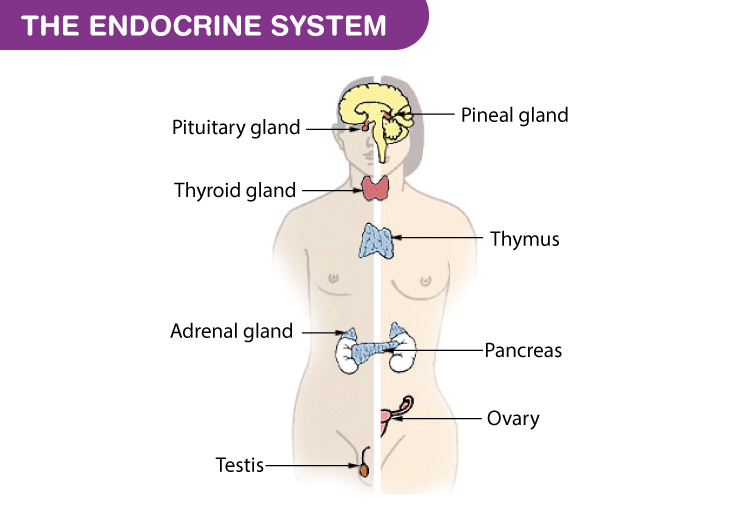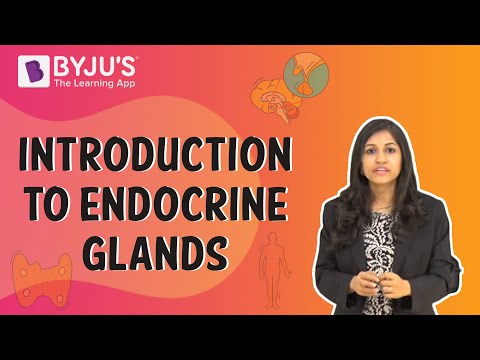According to the CBSE Syllabus 2023-24, this chapter has been renumbered as Chapter 19.
Chemical coordination and integration are primarily done by the endocrine glands, which secrete various hormones that regulate different body functions. In the animal kingdom, vertebrates have more complex and advanced endocrine systems when compared to invertebrates. Plants do not possess these glands, however, they do secrete plant hormones that control various functions.
Let us have a detailed look at the endocrine glands and the hormones secreted by them, along with their functions.
Human Endocrine System
In humans, the endocrine system comprises several ductless glands that regulate the functions of the body or evoke certain responses in the body. The endocrine system secretes certain hormones directly into the blood that help in regulating different functions of the body. The properties and functions of hormones are mentioned below.

For more information on Endocrine Glands, watch the below video

Properties of Hormones
- They are released by the endocrine glands directly into the blood.
- These do not contain antigens and are generally short-lived.
- Hormones coordinate various physical and metabolic activities and maintain homeostasis.
- These are required in very low concentrations.
- Some hormones act quickly.
- A few hormones, like proinsulin, are secreted in an inactive form. These are known as prohormones.
- Hormones are specific and are carried to a specific target organ.
Also Read, What are Hormones
Classification of Hormones
The hormones can be classified into:
- Lipid soluble hormones – These comprise thyroid and steroid hormones
- Water soluble hormones – These include peptide, protein and amine hormones.
Endocrine Glands and the Hormones Secreted
|
Endocrine Glands |
Hormones Secreted |
| Anterior Pituitary |
Adrenocorticotropic hormone |
|
Posterior Pituitary |
Oxytocin |
| Pineal Gland |
Melatonin |
|
Thyroid Gland |
Thyroxine |
| Adrenal Gland |
Adrenalin and Cortisol |
|
Testes |
Testosterone |
| Ovaries |
Estrogen, Progesterone |
Endocrine Glands and their Functions
- Hypothalamus: It regulates thirst, body temperature, hunger, sleep emotions, and moods and allows the release of other hormones.
- Thymus: Helps the adaptive immune system to function properly and produces T-cells.
- Pineal: Develops serotonin derivatives of melatonin that can affect sleep.
- Parathyroid: Regulates calcium levels in the body.
- Pituitary: Pituitary gland controls other glands. It also triggers growth and development.
- Thyroid: The hormones produced by the thyroid gland affect the heart rate.
- Adrenal: The hormones secreted by the adrenal gland regulate cortisol and stress hormones.
- Testes: In men, the testes secrete the male sex hormone, testosterone and produce sperm.
- Pancreas: This gland produces insulin crucial to maintain blood sugar levels.
- Ovaries: Ovaries secrete estrogen, progesterone and other female sex hormones.
Functions of Hormones
The important functions of hormones are:
- They help in regulating the growth and development of the body.
- They maintain homeostasis of the body.
- Initiates sexual development and reproduction.
- Controls hunger and thirst.
- Helps in food metabolism.
Also Read: Important Questions of Chemical Coordination and Integration
To explore more about Chemical Coordination and Integration, register at BYJU’S.
Questions on Chemical Coordination and Integration
- What are hormones? Give examples.
- Define endocrine glands
- Name the hormone secreted by the adrenal glands.
- What is the role of estrogen?
- Why is insulin important?
- Name the hormone secreted by the ovaries
- What is androgen?
| Also Access |
| NCERT Solutions for Class 11 Biology Chapter 22 |
| NCERT Exemplar for Class 11 Biology Chapter 22 |
Further Reading:-
| Endocrine Glands and Hormones | Plant Growth Regulators |
Frequently Asked Questions on CBSE Class 11 Science Notes Chapter 22 Chemical Coordination and Integration
What are the parts of the human endocrine system?
1. Hypothalamus 2. Pineal body 3. Pituitary 4. Thyroid and parathyroid 5. Thymus
What are hormones?
Hormones are the chemical messengers of the body. They travel in the bloodstream to tissues or organs.
What are the types of hormones?
1. Estrogen 2. Progesterone 3. Testosterone Insulin. …4. Cortisol5. Growth Hormone6. Adrenaline7. Thyroid Hormones
Comments